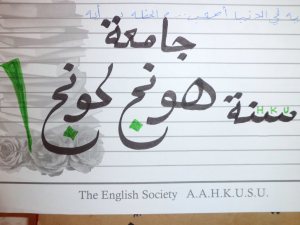
UIA, in the green green valleys of Gombak
I called this breathtaking place home for a month, and I still think of it as home. This is the International Islamic University of Malaysia (IIUM), or, in Malay, Universiti Islam Antarabangsa (UIA).
And it is home to one of the most interesting linguistic phenomena I’ve ever seen. Before we delve into the issue, however, let’s look at the background of the university for a bit: UIA is an international university, so everything is in English. It is also an Islamic university, meaning that Arabic has a heavy influence here — signs and posters are often Arabic-English bilingual, or Malay-Arabic bilingual, or feature all three. Needless to say, there is also plenty of Malay around, seeing that we are in Malaysia, after all.
One thing that caught my eye, on the very first day, was the kulliyyahs. Kulliyyah (كلية) is an Arabic word meaning college, and in a university setting, it roughly corresponds to school, department, or faculty — as in the School of English (Kulliyyah al-Ingaleezeeya) or the Faculty of Engineering (Kulliyyah al-Handasa), for instance.
Our first campus tour took us past many kulliyyahs — the Kulliyyah of Education, the Kulliyyah of Architecture, the Kulliyyah of Engineering, etc. And their names were written exactly that way, in English, on the buildings — not the Faculty of Education, or the School of Engineering, but kulliyyahs. Kulliyyah seems to be an English word in UIA!
I would not have been surprised if the names of the various faculties/schools were in Malay. Malay has tones upon tones of Arabic loanwords, not only in the realm of religion, but also scattered across the many domains of everyday use.

The "Kulliyyah" of Engineering
Kulliyyah here is used in an essentially English structure, functioning as the head noun in a noun phrase. The bit “… of engineering” is a complement to the head noun, completing its meaning — it’s a school, but of what? Oh, okay, it’s an engineering school.
Further evidence that kulliyyah is essentially an English word when used in UIA:

"Kulliyyah" features as an English word
The headings (in yellow) on this campus directory are given in English on the right and Malay on the left, separated by a stroke in between. Here kulliyyah runs on a par with “real” English words like “administration” and “facility”.
Yes, languages borrow from each other all the time. I should be no stranger to that, as a English-Chinese bilingual person growing up in colonial Hong Kong. But we usually borrow when we have no words of our own to express a certain concept, or when it’s easier to just adopt the foreign word than to come up with a novel expression/phrase. This is why “television” is still “television” (albeit with slightly different pronunciations) in much of the Arabic-speaking world, Korea, and many other places worldwide.
The English language certainly has no shortage of its own words for kulliyyah. We have “school”, “faculty”, “college” and “department”, just to name a few. So why is it that UIA cannot just choose any one of these, but has to slap the word kulliyyah on each of its teaching blocks?
An Islamic university is almost, by definition, also an arabophile one. The Qur’an was revealed in Arabic. Prophet Muhammad (peace be upon him) spoke Arabic as his mother tongue. The Arabs were among the very first Muslims. We turn our faces five times a day to the Ka’aba in Mecca, in Saudi Arabia, and recite the same prayers the world over, in Arabic. Why should it be surprising, therefore, if an Islamic university decides to incorporate as many Arabic words as possible into its environment, even if these words are not necessarily related to Islam?
* * *
I myself am very comfortable with mixing Arabic and English (and Chinese too!), and so are my crazy friends from Arabic class. We were, after all, the geniuses who invented writing Cantonese in the Arabic script, and produced ridiculous expressions such as “laisa as 貴” (meaning “not as expensive”, the first word being Arabic, the second English, and the last Chinese)!
I actually picked up this weird UIA lingo almost instantly. I knew the word kulliyyah anyway, and seeing it used in an English context while walking around campus everyday just kind of hypnotized my brain into thinking it’s an English word. 😛 I would ask my friend to wait for me “by the Kulliyyah of Engineering” and tell my teachers that back home in Hong Kong, I study in the “Kulliyyah of English”!
This will be a problem, however, if I don’t change back. No English-speaker would know what on Earth a kulliyyah is, unless they also know Arabic or Malay. Those that do know, might think I’m showing off by inserting random Arabic words into my speech. This no good lah.
*Sigh* I’m not multi-lingual; I’m mafee-lingual.







